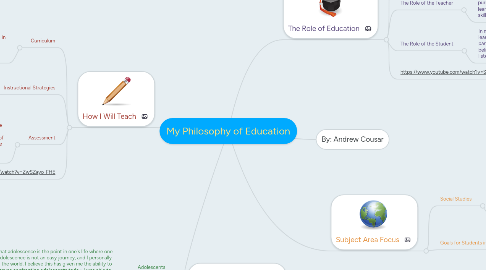
1. The Role of Education
1.1. The Purpose of Education
1.1.1. I believe that the purpose of education is to aid students in becoming upstanding and responsible citizens capable of making well-informed decisions. This is to be achieved through teaching students the characteristics and workings of democracy, as well as essential problem solving skills.
1.2. The Role of the Teacher
1.2.1. According to my philosophy, the role of the teacher in the classroom is to develop of the problem solving skills of the students, as well as to help them pursue their career and life goals. In other words, the teacher is there to facilitate learning and provide resources vital to the development of problem-solving skills.
1.3. The Role of the Student
1.3.1. In my opinion, the role of the student is primarily to listen and to learn. However, I also believe that students should learn by participating and, as a result, making discoveries. Therefore, I believe students will learn most effectively through a combination of listening and participation.
1.4. https://www.youtube.com/watch?v=SFnMTHhKdkw
2. Subject Area Focus
2.1. Social Studies
2.1.1. The subject area I have chosen as my focus is Social Studies. In particular, I wish to teach World History, as well as U.S. History. Personally, the study of history is a passion of mine, and is something I actively pursue on a daily basis. I believe that my passion for this study will have the potential to inspire other students to share this same love of history.
2.2. Goals for Students in Social Studies
2.2.1. The primary goal for students in Social Studies is to become well-informed citizens, as well as participants in the democratic process. I believe all voters should be adequately educated in the issues they decide to vote on, and a basic education in the principles of the democratic system is essential to this. Additionally, the development of problem solving skills will serve as the basis from which students can make future decisions as they relate to their academic, professional, or personal lives.
3. Who Are My Students?
3.1. Adolescents
3.1.1. I believe adolescents are special for the reason that adolescence is the point in one's life where one begins to discover the kind of person they are. Adolescence is not an easy journey, and I personally struggled to figure out what I wanted to bring to the world. I believe this has given me the ability to sympathize, if not empathize, with many of the issues confronting adolescents today. I was able to succeed academically because I had strong role models and support during my adolescent years, and I wish to do the same for others.
3.2. How Adolescents Learn
3.2.1. I believe that the best way for adolescents to learn is for them to see the real-world application of the subject material they learn in the classroom. I feel too much emphasis has been put on the material itself, rather than how this knowledge translates into real-world problem solving. Additionally, I also believe that inclusion is key to teaching adolescents, as actively participating in an activity, and making discoveries from the activity, has a much greater impact than simply listening to a lecture.
4. How I Will Teach
4.1. Curriculum
4.1.1. I believe that curriculum should be designed so as to focus on the interest of the learner in real world problems. In addition, I also believe that interdisciplinary problem solving is an important aspect of this, as the students learn how to practically apply the lessons learned in the classroom. Furthermore, I would advocate a curriculum which is set, but which allows room for the inclusion or exclusion of content based on the level of interest shown by the class.
4.2. Instructional Strategies
4.2.1. The instructional strategies used in the classroom should stimulate students to plan and complete activities and research projects. These activities and projects should include group processes, as well as democratic procedures. Particular strategies I would use include class-guided discussions, group research projects, and other means of actively including the students in the lesson. However, I also see benefit in the use of traditional lectures, for these give students the basis of knowledge from which they can draw in group activities discussions.
4.3. Assessment
4.3.1. In my opinion, the assessment of student knowledge is essential to constructing effective lesson plans, as it allows the teacher to view the progress of the individual or class. Assessment can be done through tests and quizzes, however I also believe homework is a key part of this. Assessment can also be conducted during the lesson, and I believe this is an important tool in assessing the efficacy of the lesson itself. Posing questions to the class is the most simple way to achieve this but, through the use of technology such as hand-held devices for student use, teachers can receive feedback instantly.
